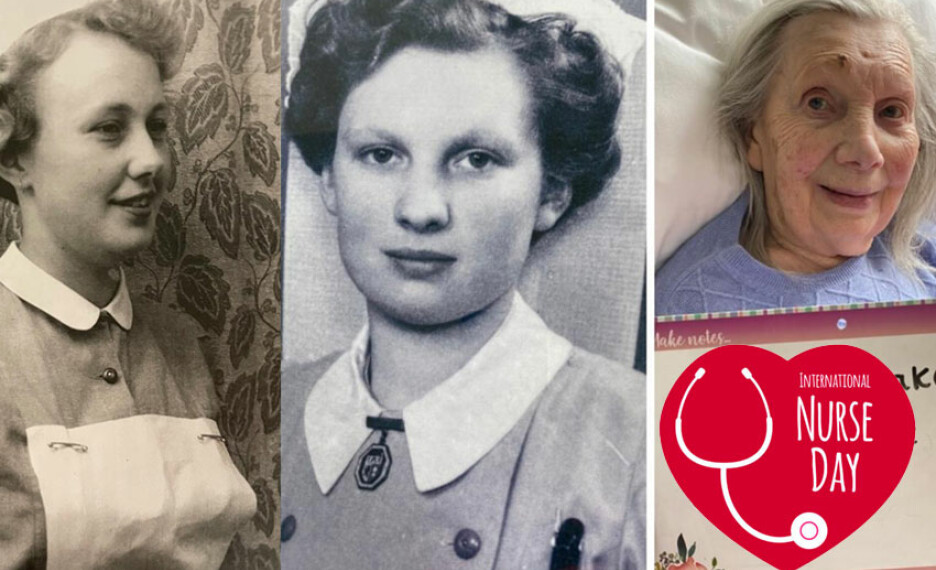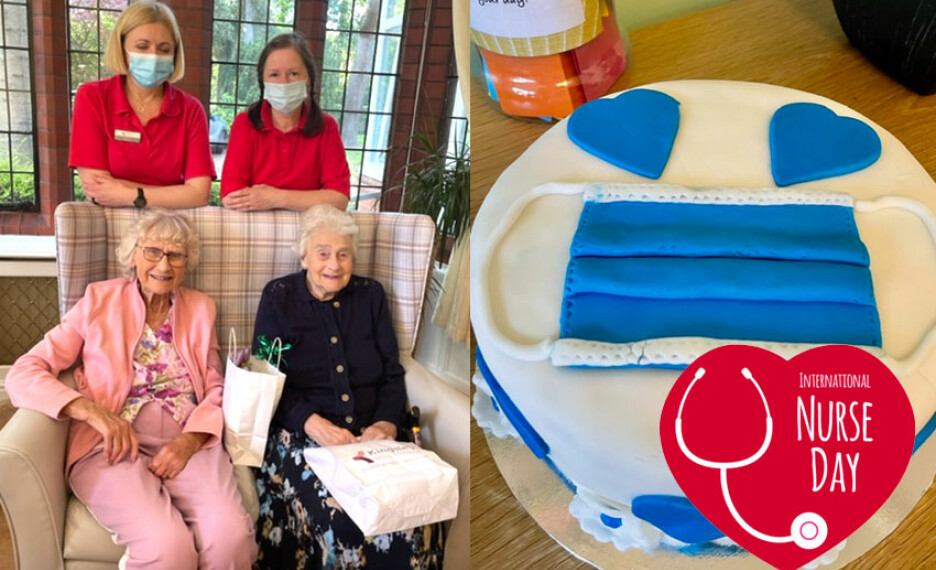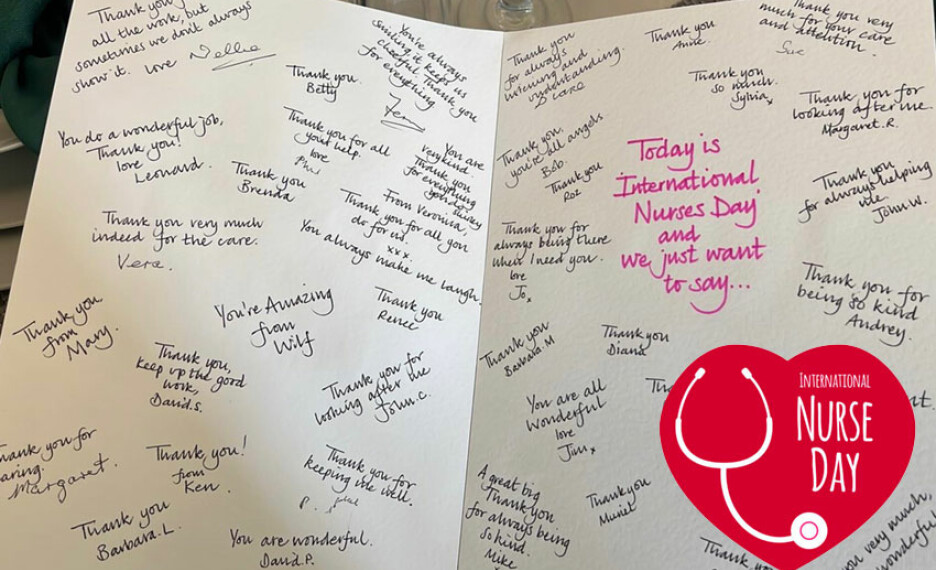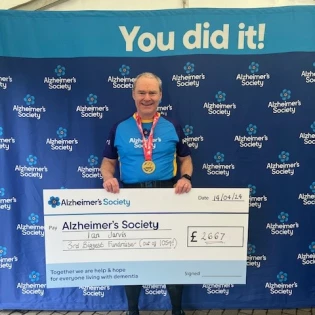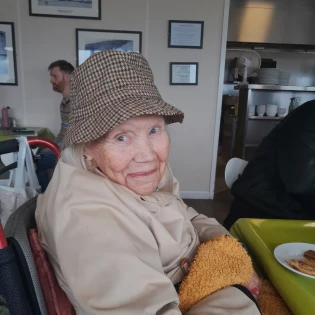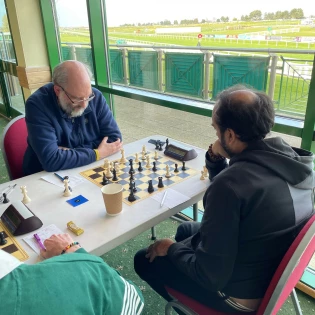Nurses past and present honoured at Redwalls Nursing Home on International Nurses Day
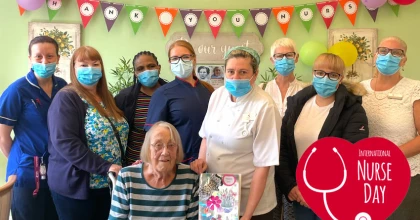

Grace Hufton worked as a nurse during the Second World War tending to wounded servicemen and civilians injured in bombing raids.
And after a career that packed a lifetime of memories into 10 years, she left nursing to get married on the day the NHS was formed in 1948.
Seventy-four years later, the distinguished service of 102-year-old Grace Emery, now a widow and a great-grandmother 14 times over, has been celebrated on International Nurses Day (May 12th).
Staff at Redwalls Nursing Home where she has lived since 2018 surprised her with flowers and gifts.
The nursing service of fellow resident Margaret Riley, 86, who left home at 18 to start nurse training at Altrincham General Hospital, was also honoured, while every nurse working in the Kingsley Healthcare home was given a bouquet.
Lauren Mackie, deputy manager at Redwalls, said: “We are all in awe when we hear the stories about these nurses who worked so valiantly in past times. Many of Grace’s stories stem from a talk she gave in 1990.
“It has also been great to celebrate the work of all our nurses in the home this year after the challenges of the pandemic.”
Grace Emery, ne Hufton, was the eldest of eight children; as an 18 year old, in the autumn of 1938, she was among the first intake of trainee nurses at the new Queen Elizabeth Hospital in Edgbaston, Birmingham.
In 1940, she was chosen to be in a guard of honour when King George 6th and Queen Elizabeth came for the official opening of the hospital.
She had to get used to difficult conditions during the war, such as working on nights during blackout when all the windows were boarded up.
During her training there was an epidemic of pneumonia and meningitis in the city and she remembers having a ward full of patients suffering from these diseases with no penicillin or other effective antibiotics that could treat these diseases.
As the war progressed there were shortages of supplies of rubber gloves, needles and syringes; nurses used to try to repair rubber gloves and re-use them when possible.
At the time of the Dunkirk evacuation, part of the hospital was taken up for military personnel. One evening, Grace and her colleagues were alerted to be ready to go on duty as soon as the wounded men arrived at the hospital.
They sat up all night and the wounded soldiers eventually arrived at 5am. The nurses went off to the wards to put the battle-worn soldiers into bed as they were, boots and all, until they could be attended to.
Then there were the air raids to contend with. When the sirens sounded Grace knew that very soon casualties would be arriving. The wards would fill up quickly and sometimes the corridors as well.
Grace is fond of recalling the time she was returning on the bus from the children’s hospital where she had been working when an air raid siren started. The city was alight and Grace and her friends could see the German planes dive bombing over the city.
She admits it was very frightening; they got off the bus and ran up the hill to the Queen Elizabeth Hospital, afraid that the planes would see and target them.
During air raids the nurses slept on palliasses on the lower ground floor of the nurses home, packed together like sardines in a tin.
On this particular night Grace and her four friends went into one of the bedrooms first and knelt down by the bed and thanked God for his protection from the German bombs. They then went down to join the other nurses in the basement.
During the end of the war Grace worked as a midwife, both in the hospital and around the district. This was before the NHS came into being and many of the babies were born at home.
Grace remembers one particular night, when one of the other nurses was off sick, that she had three women in labour in their homes at the same time.
It was a bitterly cold February and she had to travel between the three homes. She felt very responsible for these women and their babies. Fortunately, all three babies arrived safely.
Grace said she enjoyed her nursing career immensely and made many good friends. She also found great comfort in her Christian faith and often turned to the Lord for his help and guidance in so many situations and emergencies.
There was a verse from the Bible which particularly helped her, which says, “Commit everything you do to the Lord. Trust Him to help you and He will.”
Margaret nursed a critically injured motorcyclist and ended up marrying him
Margaret Riley was born in Northwich in 1936. She left home at 18 to start her nursing training at Altrincham General Hospital and continued her nursing career until she retired at the age of 60. Margaret became a SRN and worked for a few years in a nursing home in Northwich before going back to Altrincham General.
She said: “I met my future husband Mike after he came off his motorbike and was rushed into the hospital. I can remember one of the doctors shaking their head when they saw him, as if to say, ‘he’s not going to make it’.
“I can remember three different specialists coming in from different hospitals to see if there was anything they could do to help. He had gone flying off his motorbike and face first into a fence. The cut started at the top of his face, went straight through his nose down to his chin. He actually ended up losing some of his nose. The surgeons did a fantastic job and I was keen to follow his progress to begin with, but we soon became close on a personal level. The rest is history! I usually worked on a different ward in the hospital but for some reason that day I was staffed to work in casualty. If I hadn’t worked that shift, on that day, I would never of met him. We were married 60 odd years!”
She said to be a nurse you had to be patient, motivated, caring and prepared to work hard.
“Nursing is so different these days to what it was like in my day. If I could give any young nurses any advice it would be, ‘don’t give up when it gets hard even though that might seem like the easiest option. If you really want something you have to work hard for it’,” she said.
“Since I was little I always knew I was going to be a nurse, I’ve always known what I wanted. This is why I left home at 18 and went straight into my nurse’s training and I’ve never looked back since. The only downside was the lack of sleep. I remember when I first started, you would often work a night shift, come off duty, grab some breakfast and then go straight to a lecture. This was probably the thing I found most difficult but I loved the job and that was what kept me going.”
After meeting her husband Mike in casualty in Altrincham, Margaret went onto work as a theatre nurse at Northwich Infirmary and then onto ICI in Winnington. Here she had to do training on all the different chemicals used. She mainly treated burns, cuts and dressed wounds.
Find out more about Redwalls nursing home
Author: Stephen Pullinger

